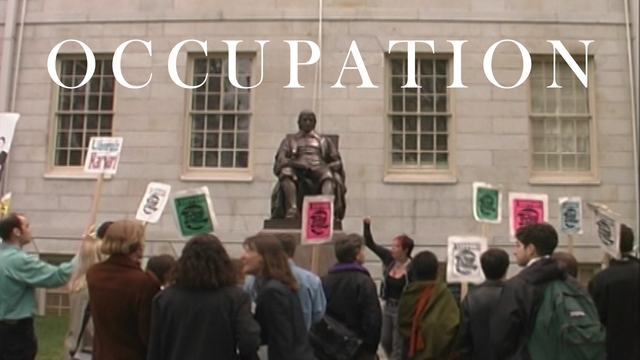Occupation
Horrified that employees at Harvard were being paid starvation wages, the students decided to act on their behalf.
 After years of failed negotiations to secure a living wage for all staff at Harvard University, the students decided a less peaceful solution was needed. Given the workers would be fired for protesting, the students decide it is up to them to take on the second largest non profit organisation in the world: Harvard University.
After years of failed negotiations to secure a living wage for all staff at Harvard University, the students decided a less peaceful solution was needed. Given the workers would be fired for protesting, the students decide it is up to them to take on the second largest non profit organisation in the world: Harvard University.
“My kids don’t really think they’re poor. When we go to a soup kitchen, they think they’re at a restaurant,” jokes dining hall worker Rhonda. Like many Harvard employees, she does not earn enough to provide for her family. She has to scour rubbish bins for clothes, toys and furniture.
Harvard is the richest university in the world. But while its endowments have tripled in the last fifteen years, it has busted unions, outsourced jobs and slashed wages and benefits for its lowest paid workers. Now many employees have two jobs and work a minimum of 14 hours a day, leaving them with little time to care for their families. “You get to the point where you don’t need a degree to know you’re getting screwed,” comments one janitor.
Appalled at Harvard’s practices, the students are galvanised into action. “We should all be outraged at how Harvard workers are treated,” protests one student. Their proposed Living Wage Programme would cost the university only 0.5% of the annual interest from endowments. But Harvard refuses to consider it. “When you compare anything against $19 billion it looks affordable,” explains spokesman Joe Wrinn. “We think a better way to lift people out of lower paying jobs is through free education, to give a longer range potential for improvement.”
After three years of failed peaceful protests the students realise that more radical action is needed. As the workers will be fired if they protest themselves, the students act on their behalf. They occupy Massachusetts Hall, site of the President’s Office. Soon a ‘tent city’ springs up near the building as other students join in the campaign.
Initially, the university hopes the students will soon give up and tries to prevent them getting any publicity. But as more and more people join the protest they change tactics. The students are threatened with the prospect of serious academic penalties. Spurred into action, the workers decide to join them. “These are our children sitting in for us. We cannot let them take the blows that were meant for us,” states worker Ed Childs.
As the energy and militancy of the campaign grows, more and more workers risk their jobs to participate. For the first time in decades, they stage sit ins of their own, speaking out forcefully about the conditions they have to endure. They demand a minimum wage of $10.25 per hour.
With the threat of wildcat strikes and civil disobedience growing, the administration is forced to negotiate. Despite earlier vowing to resign rather than give in, the President of Harvard is forced to accept unprecedented wage increases. He also agrees to stop outsourcing jobs and to establish a committee to review labour policies. “I’m full of emotion right now … Those kids are unbelievable. They are my inspiration, my heroes,” states janitor Consuelo.
However despite these gains, workers will still be paid far less than they earned ten years ago.
FULL SYNOPSIS
